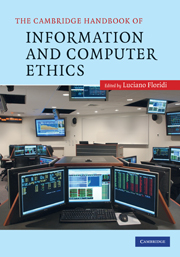Book contents
- Frontmatter
- Contents
- List of contributors
- Preface
- Acknowledgements
- Part I Introduction and background
- Part II Ethical approaches
- 3 Values in technology and disclosive computer ethics
- 4 The use of normative theories in computer ethics
- 5 Information ethics
- Part III Ethical issues in the information society
- Part IV Ethical issues in artificial contexts
- Part V Metaethics
- Epilogue: The ethics of the information society in a globalized world
- References
- Index
5 - Information ethics
Published online by Cambridge University Press: 05 June 2012
- Frontmatter
- Contents
- List of contributors
- Preface
- Acknowledgements
- Part I Introduction and background
- Part II Ethical approaches
- 3 Values in technology and disclosive computer ethics
- 4 The use of normative theories in computer ethics
- 5 Information ethics
- Part III Ethical issues in the information society
- Part IV Ethical issues in artificial contexts
- Part V Metaethics
- Epilogue: The ethics of the information society in a globalized world
- References
- Index
Summary
Introduction: in search of a unified approach to information ethics
In recent years, Information Ethics (IE) has come to mean different things to different researchers working in a variety of disciplines, including computer ethics, business ethics, medical ethics, computer science, the philosophy of information, social epistemology and library and information science. This is not surprising. Perhaps this Babel was always going to be inevitable, given the novelty of the field and the multifarious nature of the concept of information itself and of its related phenomena. It is, however, unfortunate, for it has generated some confusion about the specific nature and scope of IE. The problem, however, is not irremediable, for a unified approach can help to explain and relate the main senses in which IE has been discussed in the literature. The approach is best introduced schematically and by focusing our attention on a moral agent A.
Suppose A is interested in pursuing whatever she considers her best course of action, given her predicament. We shall assume that A's evaluations and actions have some moral value, but no specific value needs to be introduced. Intuitively, A can use some information (information as a resource) to generate some other information (information as a product) and in so doing affect her informational environment (information as target). Now, since the appearance of the first works in the eighties (for an early review see Smith 1996), Information Ethics has been claimed to be the study of moral issues arising from one or another of these three distinct ‘information arrows’ (see Figure 5.1).
Keywords
Information
- Type
- Chapter
- Information
- Publisher: Cambridge University PressPrint publication year: 2010
Accessibility standard: Unknown
Why this information is here
This section outlines the accessibility features of this content - including support for screen readers, full keyboard navigation and high-contrast display options. This may not be relevant for you.Accessibility Information
- 16
- Cited by
